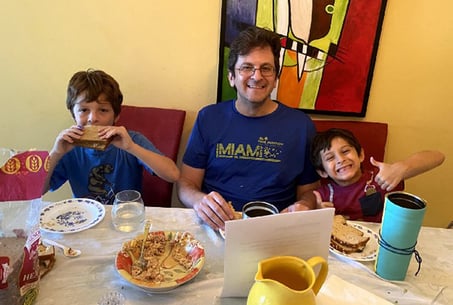What I Learned at Daddy Camp
5 min read
Date Published: 08/25/2020
Last Updated: 08/25/2020
National Fatherhood Initiative Blog / Latest Articles
5 min read

As we covered in a post a couple of weeks ago, more and more is coming out about dads and kids connecting during the coronavirus pandemic and strengthening their relationships. In light of that, we wanted to share the following inspirational post from an average dad who decided to offer his kids "Daddy Camp". As you will see, "Daddy Camp" may have done even more for dad than it did for his kids!
The original article appears below.
by Larry Schooler
I needed a vacation — I had sat glued to my computer all day, every weekday, since the first of the year, and had spent the first quarter of the year on lots of airplanes. So, I found a three day window at the end of July with no immovable meetings and I planted a flag on the calendar.
And then, it hit me.
I may have been working hard at one of my jobs, but I hadn’t been working nearly as hard another, more important one. Our two sons, eight-year-old Sammy and six-year-old Robby, had demonstrated uncanny levels of resilience and perseverance over lo these many months, finding ways to entertain themselves, keep the peace, and leave our home (mostly) intact. But just because they could manage without me all week long doesn’t mean they should. After all, if there is anything even remotely beneficial about the need to limit our movements during the pandemic, it is that we have been granted a rare opportunity to get closer to those closest to us — our families.
And yet, there I sat, sometimes just a wall away from my kids in the next room, and all I could do was work, with the occasional household chore mixed in.
Against that backdrop, I erased “vacation” from the calendar and wrote “Daddy Camp.”
I wrote a detailed set of camp rules and activities for the three days (hours of operation: 10am-8pm), and I wrote a one long, aspirational camp chant (“We love Daddy Camp because we have FUN!”). I had no idea what to expect but figured I would at least learn something and feel a bit more “essential,” at least to our sons.
Among other things, I learned:
See you at the next Daddy Camp.
This article first appeared on Medium.com and it is republished here with permission from the author.
Larry Schooler is a father of two and a husband of one. He is also a mediator, facilitator, and consultant who helps organizations of all shapes and sizes work through conflict and find consensus. He really does love long walks on the beach (since he lives near one) and long runs (he’s finished a few marathons), along with playing piano, going to museums, and listening to and producing podcasts.
Date Published: 08/25/2020
Last Updated: 08/25/2020
Download the ebook to learn how to create fatherhood initiatives that engage every sector of community life.

Train Your Staff
Fatherhood Programs
Fatherhood Data
© 2025 National Fatherhood Initiative®. All rights reserved.